
Click the image to view more information about the Leader.
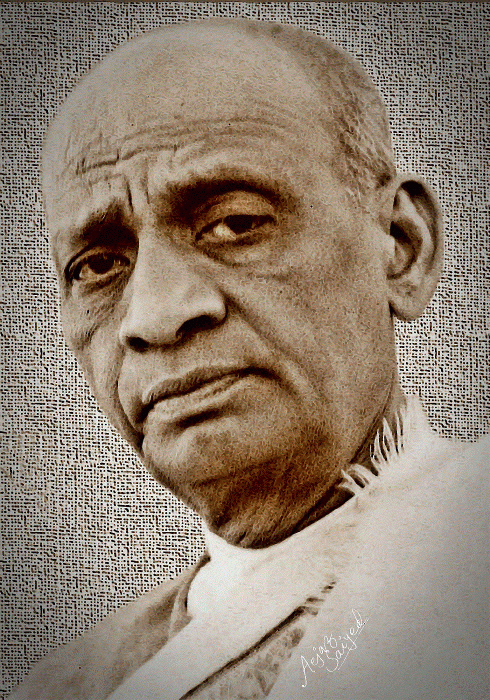
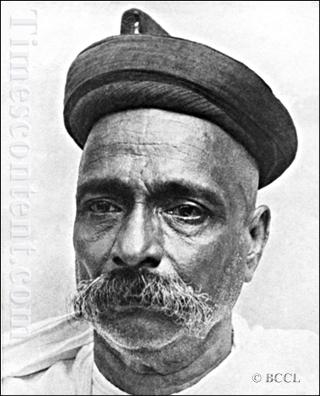
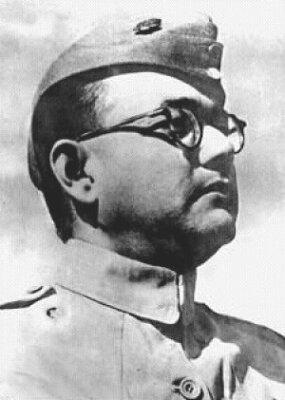
31 October 1875 -15 December 1950 (aged 75)

Vallabhbhai Jhaverbhai Patel (31 October 1875 - 15 December 1950) was an Indian barrister and statesman, one of the leaders of the Indian National Congress and one of the founding fathers of the Republic of India. He was a social leader who played a leading role in the country's struggle for independence and guided its integration into a united, independent nation. In India and elsewhere, he was often addressed as Sardar, which means Chief in Hindi, Urdu and Persian.

He was raised in the countryside of Gujarat. Patel was employed in successful practice as a lawyer. He subsequently organised peasants from Kheda, Borsad, and Bardoli in Gujarat in non-violent civil disobedience against oppressive policies imposed by the British Raj; in this role, he became one of the most influential leaders in Gujarat. He rose to the leadership of the Indian National Congress and was at the forefront of rebellions and political events, organising the party for elections in 1934 and 1937, and promoting the Quit India movement.

As the first Home Minister and Deputy Prime Minister of India, Patel organised relief for refugees in Punjab and Delhi, and led efforts to restore peace across the nation. Patel took charge of the task to forge a united India from the British colonial provinces allocated to India and more than five hundred self-governing princely states, released from British suzerainty by the Indian Independence Act 1947. Using frank diplomacy, backed with the option and use of military force, Patel's leadership persuaded almost every princely state. Often known as the "Iron Man of India" or "Bismarck of India", he is also remembered as the "Patron Saint" of India's civil servants for establishing modern all-India services.An annual commemoration of Patel, known as the Rashtriya Ekta Diwas (National Unity Day), was introduced by the Government of India in 2014 and is to be held annually on his birthday, 31 October.
23 July 1856 - 1 August 1920 (aged 64)

Bal Gangadhar Tilak (23 July 1856 - 1 August 1920), born as Keshav Gangadhar Tilak, was an Indian nationalist, journalist, teacher, social reformer, lawyer and an independence activist. He was the first leader of the Indian Independence Movement. The British colonial authorities called him "Father of the Indian unrest." He was also conferred with the honorary title of "Lokmanya", which literally means "accepted by the people (as their leader)".

Tilak was one of the first and strongest advocates of "Swaraj" (self-rule) and a strong radical in Indian consciousness. He is known for his quote in Marathi,("Swarajya is my birthright, and I shall have it!") in India. He formed a close alliance with Muhammad Ali Jinnah, later the founder of Pakistan, during the Indian Home Rule Movement.
Tilak was born in a Chitpavan Brahmin family in Ratnagiri, headquarters of the eponymous district of present day Maharashtra (then British India) on 23 July 1856. His ancestral village was Chikhali. His father, Gangadhar Tilak was a school teacher and a Sanskrit scholar who died when Tilak was sixteen. Tilak graduated from Deccan College, Pune in 1877. Tilak was amongst one of the first generation of Indians to receive a college education.[citation needed] In 1871 Tilak was married to Tapibai (a women belonging to Bal family) when he was sixteen before few months of his father's death. After marriage, her name was changed to Satyabhamabai. He obtained his matriculation in 1872. He obtained his Bachelor of Arts in first class in Mathematics from Deccan College of Pune in 1877. In 1879 he obtained his LL.B degree from Government Law College of University of Mumbai. Despite two attempts he did not succeed in qualifying in his M. A.

After graduating, Tilak started teaching mathematics at a private school in Pune. Later due to ideological differences with the colleagues in the new school, he withdrew and became a journalist later. Tilak actively participated in public affairs. He stated:"Religion and practical life are not different. To take Sanyasa (renunciation) is not to abandon life. The real spirit is to make the country your family work together instead of working only for your own. The step beyond is to serve humanity and the next step is to serve God."
January 23, 1897-August 18, 1945

Subhas Chandra Bose 23 January 1897 -18 August 1945 (aged 48) was an Indian nationalist whose attempt during World War II to rid India of British rule with the help of Nazi Germany and Japan left a troubled legacy.The honorific Netaji (Hindustani language: "Respected Leader"), first applied to Bose in Germany, by the Indian soldiers of the Indische Legion and by the German and Indian officials in the Special Bureau for India in Berlin, in early 1942, was by 1990 used widely throughout India.Earlier, Bose had been a leader of the younger, radical, wing of the Indian National Congress in the late 1920s and 1930s, rising to become Congress President in 1938 and 1939.However, he was ousted from Congress leadership positions in 1939 following differences with Mohandas K. Gandhi and the Congress high command.He was subsequently placed under house arrest by the British before escaping from India in 1940.

Bose arrived in Germany in April 1941, where the leadership offered unexpected, if sometimes ambivalent, sympathy for the cause of India's independence, contrasting starkly with its attitudes towards other colonised peoples and ethnic communities.In November 1941, with German funds, a Free India Centre was set up in Berlin, and soon a Free India Radio, on which Bose broadcast nightly. A 3,000-strong Free India Legion, comprising Indians captured by Erwin Rommel's Afrika Korps, was also formed to aid in a possible future German land invasion of India.During this time Bose also became a father; his wife,or companion,Emilie Schenkl, whom he had met in 1934, gave birth to a baby girl.By spring 1942, in light of Japanese victories in southeast Asia and changing German priorities, a German invasion of India became untenable, and Bose became keen to move to southeast Asia.Adolf Hitler, during his only meeting with Bose in late May 1942, suggested the same, and offered to arrange for a submarine.Identifying strongly with the Axis powers, and no longer apologetically, Bose boarded a German submarine in February 1943.In Madagascar, he was transferred to a Japanese submarine from which he disembarked in Japanese-held Sumatra in May 1943.

With Japanese support, Bose revamped the Indian National Army (INA), then composed of Indian soldiers of the British Indian army who had been captured in the Battle of Singapore.To these, after Bose's arrival, were added enlisting Indian civilians in Malaya and Singapore. The Japanese had come to support a number of puppet and provisional governments in the captured regions, such as those in Burma, the Philippines and Manchukuo. Before long the Provisional Government of Free India, presided by Bose, was formed in the Japanese-occupied Andaman and Nicobar Islands.Bose had great drive and charisma-creating popular Indian slogans, such as "Jai Hind,"=and the INA under Bose was a model of diversity by region, ethnicity, religion, and even gender. However, Bose turned out to be militarily unskilled,and his military effort was short lived. In late 1944 and early 1945 the British Indian Army first halted and then devastatingly reversed the Japanese attack on India. Almost half the Japanese forces and fully half the participating INA contingent were killed.The INA was driven down the Malay Peninsula, and surrendered with the recapture of Singapore. Bose had earlier chosen not to surrender with his forces or with the Japanese, but rather to escape to Manchuria with a view to seeking a future in the Soviet Union which he believed to be turning anti-British. He died from third degree burns received when his plane crashed in Taiwan.Some Indians, however, did not believe that the crash had occurred, with many among them, especially in Bengal, believing that Bose would return to gain India's independence.
The Indian National Congress, the main instrument of Indian nationalism, praised Bose's patriotism but distanced itself from his tactics and ideology, especially his collaboration with Fascism.[26] The British Raj, though never seriously threatened by the INA,charged 300 INA officers with treason in the INA trials, but eventually backtracked in the face both of popular sentiment and of its own end.
28 January 1865-17 November 1928 (age 63)
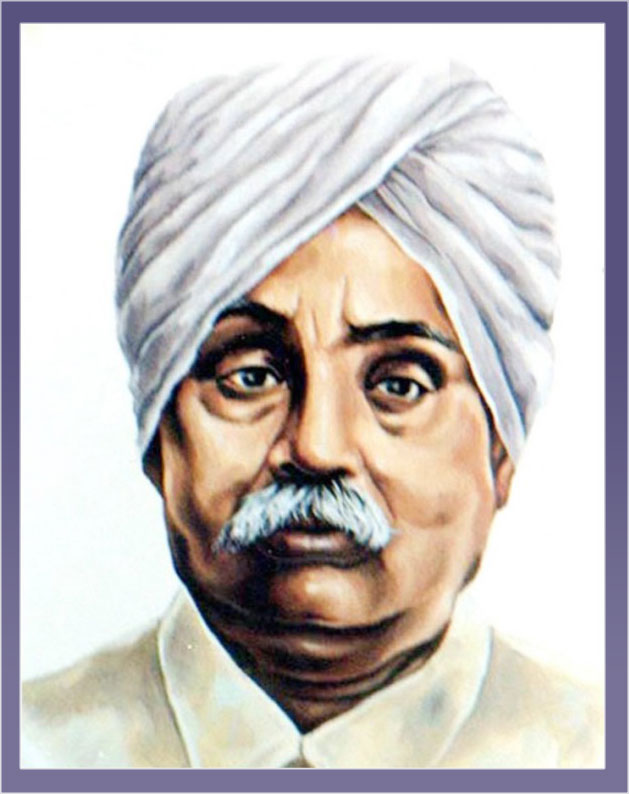
Lala Lajpat Rai About this sound pronunciation(28 January 1865 - 17 November 1928) was an Indian Punjabi author and politician who is chiefly remembered as a leader in the Indian fight for independence from the British Raj. He was popularly known as Punjab Kesari meaning The Lion of Punjab also known as "Sher-E- Punjab" in Punjabi. He was part of the Lal Bal Pal trio.He was also associated with activities of Punjab National Bank and Lakshmi Insurance Company in their early stages. He sustained serious injuries by the police when leading a non-violent protest against the Simon Commission and died less than three weeks later. His death anniversary (17 November) is one of several days celebrated as Martyrs' Day in India.
Lajpat Rai was born in Dhudike (now in Moga district, Punjab) on 28 January 1865.(The word 'Lala' is an honorific, applied to prominent Hindu men of the time.) His father was an Aggarwal by caste.

Rai had his initial education in Government Higher Secondary School, Rewari (now in Haryana, previously in Punjab), in the late 1870s and early 1880s, where his father, Radha Krishan, was an Urdu teacher. Rai was influenced by Hinduism and created a career of reforming Indian policy through politics and writing.(When studying law in Lahore, he continued to practice Hinduism. He became a large believer in the idea that Hinduism, above nationality, was the pivotal point upon which an Indian lifestyle must be based.) Hinduism, he believed, led to practices of peace to humanity, and the idea that when nationalist ideas were added to this peaceful belief system, a non-secular nation could be formed. His involvement with Hindu Mahasabha leaders gathered criticism from the Bharat Sabha as the Mahasabhas were non-secular, which did not conform with the system laid out by the Indian National Congress. This focus on Hindu practices in the subcontinent would ultimately lead him to the continuation of peaceful movements to create successful demonstrations for Indian independence. He was a devotee of Arya Samaj and was editor of Arya Gazette, which he set up during his student time.

After studying law at the Government College in Lahore, Lajpat Rai practised at Hissar and Lahore, where he helped to establish the nationalistic Dayananda Anglo-Vedic School and became a follower of Dayananda Sarasvati, the founder of the reformist Hindu society Arya Samaj ("Society of Noble People"). After joining the Indian National Congress, and taking part in political agitation in the Punjab, Lajpat Rai was deported to Mandalay, Burma (Myanmar), without trial, in May 1907. In November, however, he was allowed to return when the viceroy, Lord Minto, decided that there was insufficient evidence to hold him for subversion. Lajpat Rai's supporters attempted to secure his election to the presidency of the party session at Surat in December 1907, but elements favouring co-operation with the British refused to accept him, and the party split over the issu
5 September 1872-18 November 1936
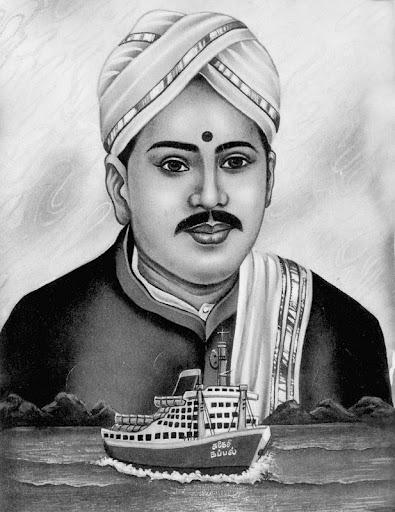
Valliappan Olaganathan Chidambaram Pillai (1872-1936), popularly known by his initials, V.O.C.also known as Kappalottiya Tamilan "The Tamil Helmsman", was a Tamil political leader. He was a disciple of Bal Gangadhar Tilak.
He launched the first indigenous Indian shipping service between Tuticorin and Colombo with the Swadeshi Steam Navigation Company, competing against British ships. At one time a member of the Indian National Congress, he was later charged with sedition by the British government and sentenced to life imprisonment; his barrister license was stripped.

V. O. Chidambaram Pillai was born on 5 September 1872 in Ottapidaram, Tuticorin district to Olaganathan Pillai and Paramayee Ammal.[1] When Chidambaram was six years old he learnt Tamil from the teacher Veeraperumal Annavi. He heard stories about Lord Shiva from his grandmother and stories from Ramayana from his grandfather.

He heard stories from Mahabharatha told by Allikulam Subramanya Pillai. As a child, he played goli (marbles), kabaddi, horse riding, swimming, stilt walking, archery, wrestling, silambattam and chess.
11 September 1895-15 November 1982 (aged 87)
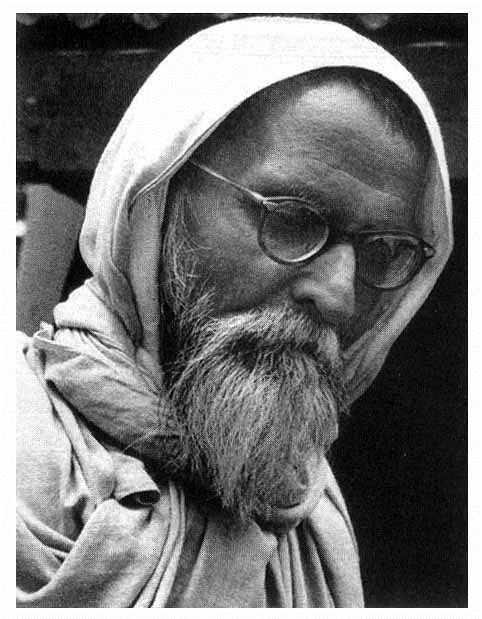
Vinayak Narahari "Vinoba" Bhave (About this sound pronunciation ( 11 September 1895 - 15 November 1982) was an Indian advocate of nonviolence and human rights. Often called Acharya (Sanskrit for teacher), he is best known for the Bhoodan Movement. He is considered as a National Teacher of India and the spiritual successor of Mohandas Gandhi.

Vinoba (born Vinayaka Rao Bhave) was born into a pious Chitpavan Brahmin family on 11 September 1895 in a small village called Gagode (present day Gagode Budruk[2]) in Kolaba now in Pen, Raigad district of Maharashtra. Vinayaka was the eldest son of Narahari Shambhu Rao and Rukmini Devi. The couple had five children - four sons and one daughter, named Vinayaka (affectionately called Vinya), Balakrishna, Shivaji and Dattatreya. His father, Narahari Shambhu Rao was a trained weaver with a rationalist modern outlook, and worked in Baroda.

Vinayaka was brought up by his grandfather, Shamburao Bhave and was greatly influenced by his mother Rukmini Devi, a religious woman from Karnataka. Vinayak was highly inspired after reading the Bhagavad Gita, at a very young age.
14 April 1891-6 December 1956 (aged 65)

Bhimrao Ramji Ambedkar ( 14 April 1891 - 6 December 1956), popularly known as Babasaheb, was an Indian jurist, economist, politician and social reformer who inspired the Modern Buddhist Movement and campaigned against social discrimination of Dalits, women and labour. He was Independent India's first law minister and the principal architect of the Constitution of India.

Ambedkar was a prolific student, earning a law degree and various doctorates from Columbia University and the London School of Economics, and gained a reputation as a scholar for his research in law, economics and political science. In his early career he was an economist, professor, and lawyer. His later life was marked by his political activities, where he became involved in the negotiations for India's independence campaigning by publishing journals advocating political rights and social freedom for 'untouchables' and contributing significantly to the establishment of the state of India. In 1956 he converted to Buddhism, initiating mass conversions of Dalits.

In 1990, Ambedkar was posthumously conferred with the Bharat Ratna, India's highest civilian award.Ambedkar's legacy includes numerous memorials and depictions in popular culture.
October 11, 1902-October 8, 1979
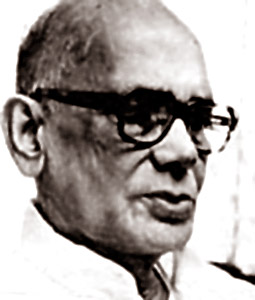
Jayaprakash Narayan (Harsu Dayal Srivastava)(11 October 1902 - 8 October 1979), popularly referred to as JP or Lok Nayak (Hindi for "people's hero"), was an Indian independence activist, social reformer and political leader, remembered especially for leading the mid-1970s opposition against Prime Minister Indira Gandhi, for whose overthrow he called a "total revolution". His biography, Jayaprakash, was written by his nationalist friend and an eminent writer of Hindi literature, Ramavriksha Benipuri. In 1999, he was posthumously awarded the Bharat Ratna, India's highest civilian award, in recognition of his social work. Other awards include the Magsaysay award for Public Service in 1965. The Patna airport is also named after him. The largest hospital run by the Delhi government and the teaching hospital of the famous Maulana Azad Medical College, Lok Nayak Jayaprakash Hospital, is also named after him. It was formerly called Irwin hospital. There is also a park in his name, situated on Bahadur Shah Zafar Marg, in New Delhi, just opposite to Maulana Azad Medical College.

Jayprakash Narayan was born on 11 October 1902 in the village of Sitabdiara in Saran district of Bihar, India. He came from a Kayastha family.He was the fourth child of Harsu Dayal Srivastava and Phul Rani Devi. His father Harsu Dayal was a junior official in the Canal Department of the State government and was often touring the region. When Narayan was 9 years old, he left his village to enroll in 7th class of the collegiate school at Patna. While in school, Jayaprakash read magazines like Saraswati, Prabha and Pratap, books like Bharat-Bharati, and poems by Maithilsharan Gupta and Bharatendu Harishchandra which described the courage and valour of the Rajput kings.

Jayaprakash also read the Bhagwad Gita. His essay, "The present state of Hindi in Bihar" won a best essay award. He excelled in school and by 1918 completed school and undertook the 'State Public Matriculation Examination' and won a District merit scholarship to Patna college.



